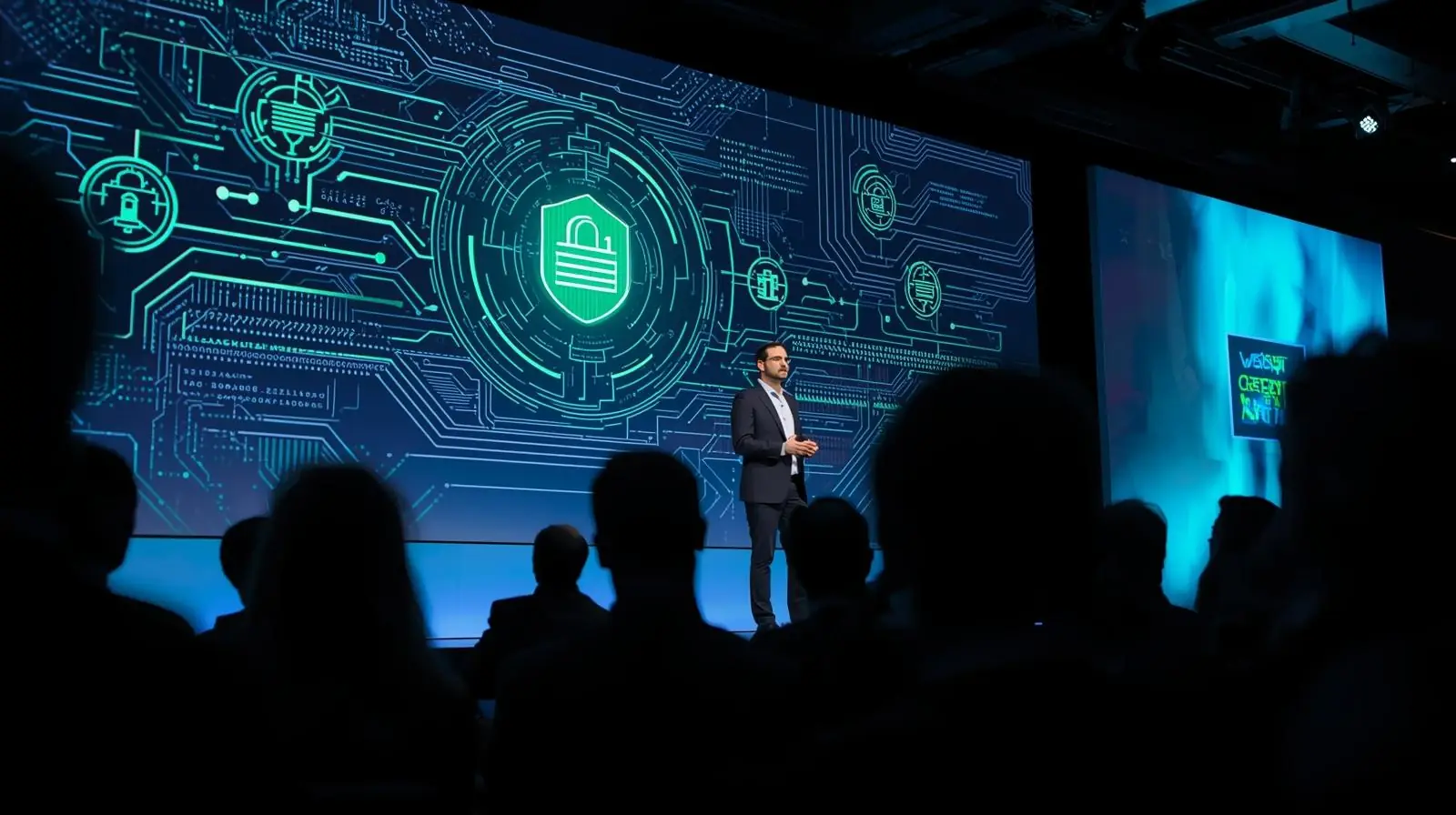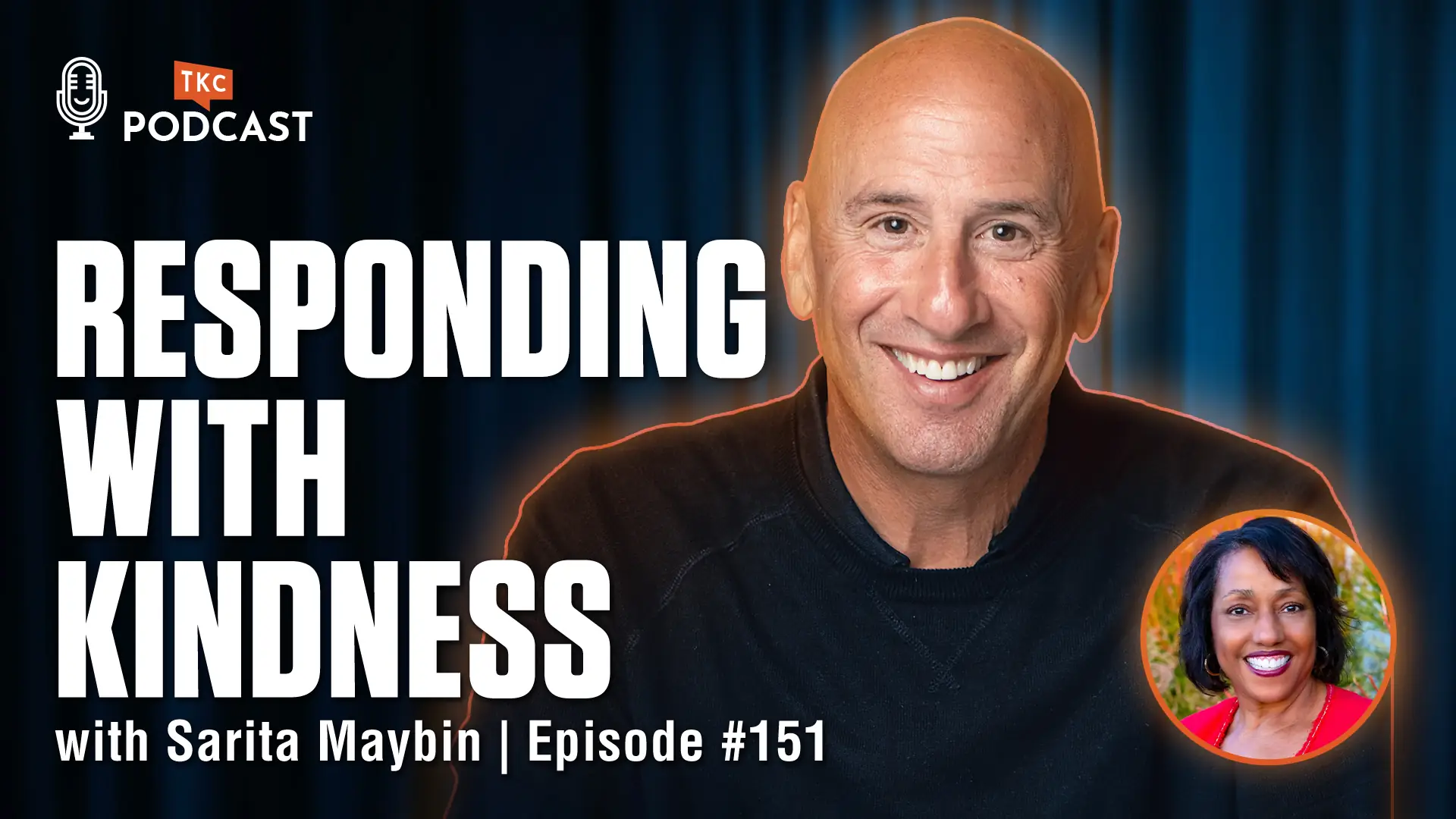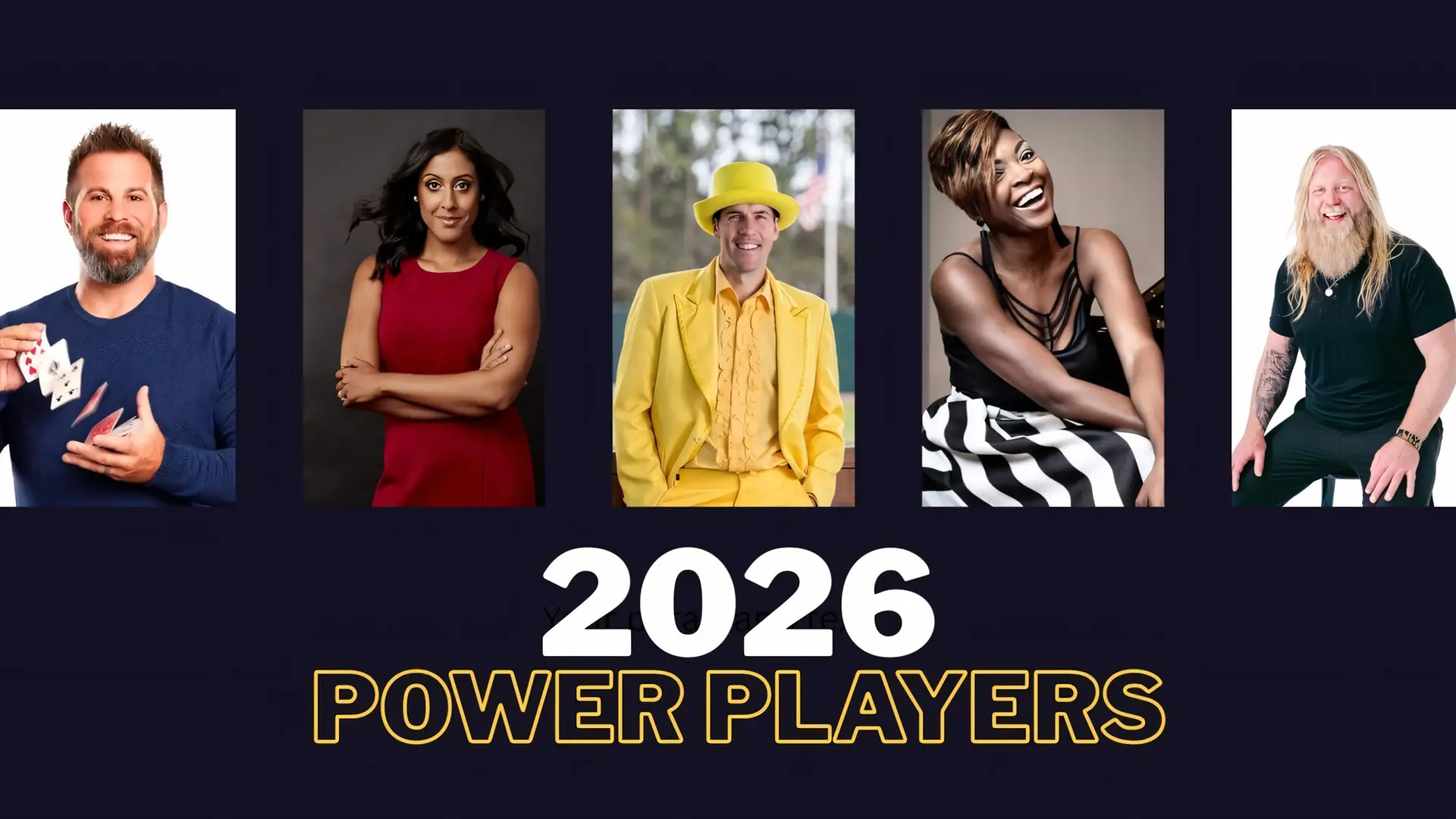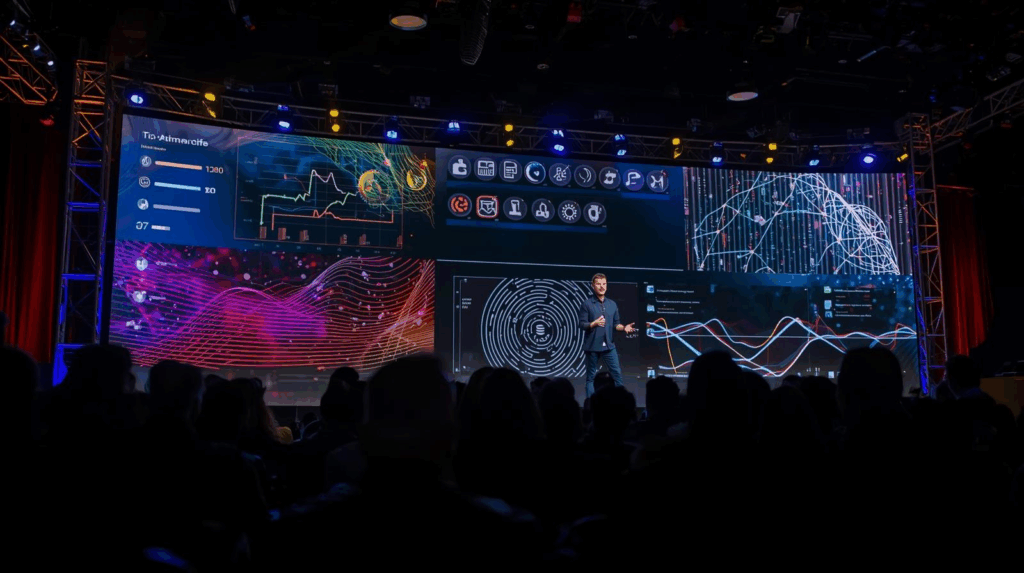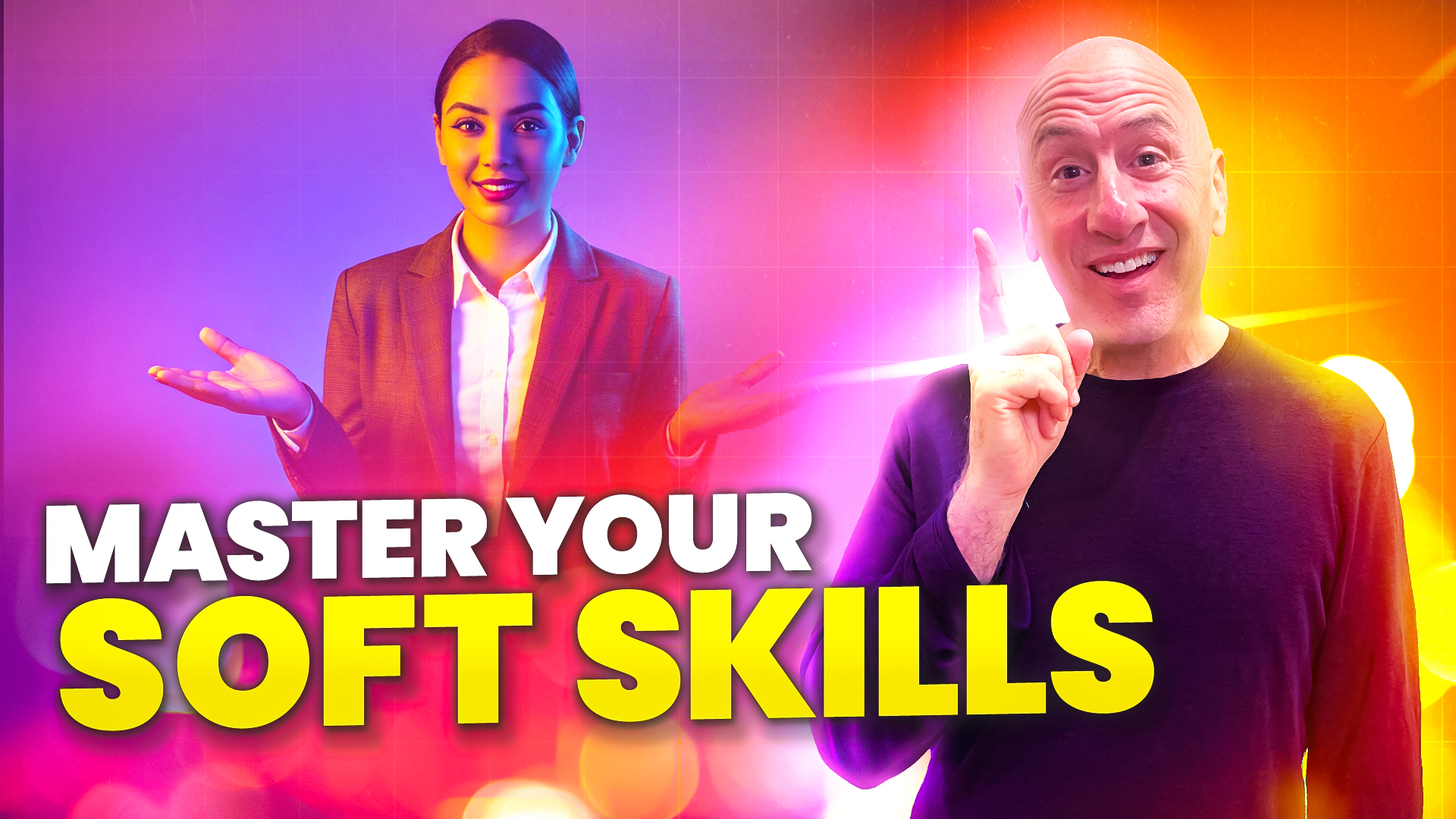
July 25, 2025Soft Skills You Need to Become a Great Event Planner
Master the soft skills that transform good event planners into great ones with expert insights from Emmy-winning producer Gabriella Robuccio.
What separates a competent event planner from an extraordinary one? The answer might surprise you—it’s not about mastering the latest event technology or memorizing vendor contact lists. The true differentiator lies in developing essential soft skills that enable you to navigate complex relationships, communicate effectively under pressure, and build the trust that keeps clients coming back.
Emmy Award-winning event producer Gabriella Robuccio discovered this truth during her 15-year career managing high-stakes productions for global brands like ESPN, FIFA, and international healthcare foundations. After orchestrating countless events with million-dollar budgets and tight deadlines, she realized that the most successful event professionals weren’t necessarily those with the most technical expertise—they were the ones who had mastered the art of human connection.
This realization led Gabriella to found ProEventTips, where she now helps event professionals develop the relationship management skills that actually make the difference between good and great. In our recent conversation, she shared invaluable insights about how soft skills can transform your approach to event planning and elevate your entire career.
Throughout this post, we’ll explore the specific soft skills that can help you become a great event planner, examine real-world applications of these abilities, and discover practical strategies for developing them in your own professional practice. Whether you’re just starting your journey in event planning or you’re a seasoned professional looking to enhance your effectiveness, these insights will provide you with actionable tools for success.
The Foundation of Event Success: Understanding Why Soft Skills Matter
The event industry has evolved dramatically over the past decade. While technology has streamlined many logistical aspects of event planning, the human element has become more critical than ever. Modern event planners must navigate increasingly complex stakeholder relationships, manage diverse teams across multiple time zones, and adapt to rapidly changing client expectations—all while maintaining their composure under intense pressure.
Gabriella’s transition from managing big-budget logistics to focusing on relationship management illustrates a fundamental truth about our industry. The real challenges in events aren’t typically about booking the right venue or coordinating catering timelines. Instead, they center around managing expectations, resolving conflicts before they escalate, and building the kind of trust that enables smooth collaboration even when things don’t go according to plan.
Consider the typical day of an event planner: you might start your morning mediating between a client who wants to add last-minute agenda items and a venue coordinator who insists the changes aren’t feasible. By lunch, you’re counseling an anxious speaker who’s worried about their presentation while simultaneously reassuring a vendor who’s concerned about payment terms. Before the day ends, you’re likely facilitating discussions between team members who have different visions for the same event element.
Each of these scenarios requires a sophisticated understanding of human psychology, advanced communication skills, and the emotional intelligence to read between the lines of what people are actually saying. These soft skills enable you to move beyond simply coordinating logistics to truly orchestrating experiences that exceed expectations.
The professionals who thrive in this environment understand that every interaction is an opportunity to build trust, demonstrate competence, and strengthen relationships that will serve them throughout their careers. They recognize that leadership in event planning isn’t about having all the answers—it’s about knowing how to ask the right questions, listen actively to the responses, and synthesize diverse perspectives into actionable solutions.
Patience: The Underestimated Superpower of Successful Event Planners
In an industry where everything seems urgent and deadlines are non-negotiable, patience might seem like a luxury you can’t afford. However, Gabriella emphasizes that patience is actually one of the most powerful tools in an event planner’s arsenal. This isn’t about moving slowly or avoiding difficult conversations—it’s about taking the time to truly understand what’s happening beneath the surface of every interaction.
Patience in event planning manifests in several critical ways. First, it’s the ability to pause and listen when a client is explaining their vision, even when their initial description seems unrealistic or poorly thought out. Instead of immediately jumping to solutions or pointing out obstacles, patient event planners ask clarifying questions that help clients articulate what they’re really trying to achieve.
This approach often reveals that the client’s stated request isn’t actually what they need. For example, a corporate client might insist they want a “high-energy networking event” when what they’re really seeking is a structured environment where their introverted employees feel comfortable making meaningful connections. A patient event planner will uncover this distinction through careful questioning and active listening, then design an experience that truly serves the client’s underlying objectives.
Patience also proves invaluable when working with vendors and team members who are feeling overwhelmed or stressed. Rather than adding pressure by demanding immediate responses or solutions, experienced event planners create space for people to process information and contribute their best thinking. This approach not only leads to better outcomes but also strengthens working relationships that will prove valuable on future projects.
The practice of patience extends to professional development as well. Building soft skills takes time, and the most successful event planners understand that becoming truly excellent at relationship management is a long-term investment. They approach skill development with the same patience they bring to client relationships, recognizing that authentic growth happens through consistent practice rather than quick fixes.
Developing patience as an event planner requires intentional practice. Start by building buffer time into your conversations and meetings. Instead of scheduling back-to-back calls, create space between interactions so you’re not rushed when important discussions arise. Practice the art of asking follow-up questions before offering solutions, and notice how this approach changes the quality of information you receive from clients and colleagues.
Active Listening: The Secret to Understanding What Clients Really Want
Active listening goes far beyond simply hearing the words someone speaks. In the context of event planning, it’s about creating an environment where clients, vendors, and team members feel genuinely heard and understood. This skill enables you to gather the nuanced information that transforms a good event into an extraordinary one.
Gabriella’s experience with high-profile clients taught her that active listening often reveals the emotional drivers behind logistical requests. A client who keeps asking about security details might actually be expressing anxiety about their reputation. A team member who raises repeated questions about timing might be concerned about their ability to deliver quality work under pressure. When you develop the ability to listen for these underlying concerns, you can address them proactively rather than reactively.
The practice of active listening in event planning involves several key components. Physical presence is crucial—this means putting away devices, making eye contact, and using body language that demonstrates engagement. It also requires emotional presence, which involves managing your own stress and urgency so you can fully focus on what the other person is communicating.
Effective active listening also includes the skill of reflective responding. This means paraphrasing what you’ve heard and asking for confirmation before moving forward. For example, instead of simply saying “I understand you want more networking time,” you might respond with “It sounds like you’re concerned that your attendees won’t have enough opportunity to make meaningful connections with each other. Is that right, and are there specific outcomes you’re hoping those connections will lead to?”
This approach serves multiple purposes. It ensures you’ve correctly understood the request, it demonstrates that you value the client’s input, and it often prompts additional information that helps you design a more targeted solution. Many event planning mistakes stem from assumptions about what clients want rather than taking the time to truly understand their objectives.
The empowerment that comes from feeling truly heard is powerful. When clients and colleagues experience genuine active listening, they become more invested in the success of the project and more willing to collaborate effectively. They’re also more likely to trust your judgment when you need to suggest alternatives or address unexpected challenges.
Tailored Communication: Speaking Everyone’s Language
One of the most sophisticated soft skills Gabriella developed during her career is the ability to tailor her communication style to match the needs and preferences of different stakeholders. This goes beyond simply adjusting your vocabulary for different audiences—it’s about understanding how different people process information and prefer to make decisions.
In the complex ecosystem of event planning, you’re constantly interacting with people who have vastly different communication styles and priorities. A CFO who’s approving your budget thinks in terms of ROI and risk management. A creative director is focused on brand alignment and aesthetic impact. A facilities manager is concerned with logistics and safety protocols. An executive assistant is thinking about their boss’s schedule and preferences.
Successful event planners develop the ability to speak each of these “languages” fluently. This doesn’t mean being manipulative or inauthentic—it means presenting information in the format and context that makes the most sense to your audience. When speaking with financial stakeholders, you might emphasize cost savings and measurable outcomes. When communicating with creative teams, you focus on vision and experience design.
The mapping exercise Gabriella suggests—identifying which stakeholders need high-touch updates versus simple “keep in loop” notes—is a practical application of tailored communication. Some people want detailed project timelines and regular check-ins because that’s how they feel confident and informed. Others prefer brief summaries and only want to be contacted when decisions are required.
Understanding these preferences prevents miscommunication and builds trust. When you consistently communicate with people in their preferred style, they view you as professional and considerate. This perception makes them more likely to respond quickly to your requests, more willing to be flexible when challenges arise, and more inclined to recommend your services to others.
Tailored communication also extends to change management, which is inevitable in event planning. Some stakeholders need extensive background information and time to process changes, while others prefer quick decisions and immediate action. By adapting your approach to these different styles, you can guide groups through necessary adjustments without creating unnecessary stress or conflict.
Developing this skill requires careful observation and experimentation. Pay attention to how different people respond to your communication style. Notice which approaches generate quick, helpful responses and which seem to create confusion or delay. Over time, you’ll develop an intuitive understanding of how to adjust your communication for maximum effectiveness.
Managing Stakeholder Expectations: The Art of Alignment
Perhaps no aspect of event planning requires more sophisticated soft skills than managing stakeholder expectations. Every event involves multiple parties with different priorities, different definitions of success, and different levels of understanding about what’s realistic within the given constraints of time, budget, and resources.
The challenge becomes even more complex when you consider that stakeholders often don’t fully understand their own expectations until they see something that doesn’t meet them. A client might say they want a “elegant reception” but become dissatisfied when they see a setup that feels too formal for their company culture. A speaker might agree to a 45-minute presentation but later express concern that they don’t have enough time to cover all their key points.
Successful expectation management starts with what Gabriella describes as strategic stakeholder mapping. This involves identifying not just who your stakeholders are, but understanding their influence levels, communication preferences, decision-making styles, and underlying motivations. Once you have this understanding, you can design communication strategies that keep everyone aligned throughout the planning process.
The most effective event planners proactively surface potential misalignments before they become problems. This might involve showing clients examples of previous events that match their stated preferences to confirm you’re interpreting their vision correctly. It could mean walking speakers through the venue space so they understand the environment where they’ll be presenting. It often includes creating detailed timelines that help all parties understand how their individual contributions fit into the larger picture.
Business leadership in event planning often means making difficult decisions about competing priorities and communicating those decisions in ways that maintain stakeholder buy-in. For example, if budget constraints mean you can’t accommodate every enhancement a client has requested, you need to guide them through a prioritization process that feels collaborative rather than restrictive.
This requires the emotional intelligence to recognize when stakeholders are frustrated or disappointed, even when they’re not expressing these feelings directly. It also demands the communication skills to acknowledge these emotions while redirecting focus toward achievable solutions. The most skilled event planners can transform potentially negative conversations about limitations into positive discussions about optimization and strategic focus.
The corporate culture of your client organization significantly impacts how you approach expectation management. Some cultures value direct, efficient communication and quick decision-making. Others prioritize consensus-building and thorough analysis. Understanding these cultural dynamics helps you design processes that feel natural and comfortable for your stakeholders.
Conflict Resolution: Turning Challenges Into Opportunities
Conflict is inevitable in event planning, but how you handle it can determine whether it derails your project or strengthens your relationships. Gabriella’s approach to conflict resolution emphasizes getting ahead of problems before they escalate into full-blown disputes. This proactive strategy requires developing the ability to recognize early warning signs and intervene with appropriate soft skills.
Many conflicts in event planning stem from miscommunication, competing priorities, or unrealistic expectations. By the time these issues surface as open disagreements, they’ve often grown more complex and emotionally charged than necessary. The most effective event planners develop radar for detecting potential conflicts while they’re still manageable.
This might involve noticing when a vendor seems hesitant to commit to a timeline, when a client repeatedly asks the same questions, or when team members start avoiding certain topics in meetings. Each of these signals suggests underlying concerns that haven’t been fully addressed. By creating safe opportunities for people to express these concerns, you can often resolve issues before they impact the event or damage relationships.
When conflicts do arise, the way you frame the resolution process significantly impacts the outcome. Instead of approaching disputes as zero-sum games where someone must win and someone must lose, skilled event planners position challenges as collaborative problem-solving opportunities. This reframing helps maintain working relationships and often leads to creative solutions that satisfy everyone’s core interests.
The use of open questions, as Gabriella suggests, is particularly powerful in conflict resolution. Instead of making demands or issuing directives, asking for input and help creates an atmosphere of partnership rather than confrontation. For example, instead of saying “You need to deliver this by Thursday,” you might say “We need this delivered by Thursday to stay on track with our timeline. What would you need to make that happen?”
This approach accomplishes several things simultaneously. It acknowledges the other person’s expertise and autonomy, it invites collaboration rather than compliance, and it often reveals information about constraints or challenges you weren’t aware of. When people feel their input is valued, they’re more likely to stretch to accommodate difficult requests.
Employee engagement principles apply directly to conflict resolution in event planning. When vendors, clients, and team members feel genuinely involved in finding solutions, they become more committed to implementing those solutions successfully. They also develop greater appreciation for the complexity of event planning, which makes them more reasonable partners on future projects.
Building Trust: The Ultimate Event Planning Currency
Throughout her career, Gabriella learned that success in events doesn’t come from being the busiest person in the room—it comes from being the most trusted. This insight reveals perhaps the most important soft skill for event planners: the ability to build and maintain trust consistently across all relationships and interactions.
Trust in event planning is multifaceted. There’s competence trust—the belief that you have the skills and knowledge to deliver what you promise. There’s reliability trust—confidence that you’ll follow through on commitments and communicate proactively about any changes. There’s integrity trust—the assurance that you’ll be honest about challenges and transparent about decision-making processes.
Building competence trust requires demonstrating your expertise through your communication and decision-making. This doesn’t mean having all the answers immediately, but rather asking intelligent questions, providing well-reasoned recommendations, and explaining your thinking process when guiding stakeholders through complex decisions. Clients and colleagues trust event planners who can clearly articulate why certain approaches will be more effective than others.
Reliability trust develops through consistent follow-through on small commitments as much as large ones. Responding to emails within your stated timeframe, arriving prepared for meetings, and updating stakeholders according to the schedule you’ve established all contribute to the perception that you can be counted on when it matters most.
Integrity trust often determines whether relationships survive the inevitable challenges that arise in event planning. When something goes wrong—and something always does—stakeholders need to believe that you’ll tell them the truth about what happened, take appropriate responsibility, and work diligently to fix the problem. This type of trust is built through transparency in both good times and difficult ones.
The attitude you bring to challenges significantly impacts trust-building. Event planners who approach problems with calm professionalism and solution-focused thinking inspire confidence even in stressful situations. Those who become defensive, blame others, or panic under pressure erode trust quickly and often permanently.
Trust also requires what might be called emotional reliability—the ability to remain calm and centered even when others are stressed or upset. When you can be the steady presence that helps others navigate anxiety and uncertainty, you become indispensable to your clients and colleagues.
The Strategic Application of Soft Skills: Effort Allocation and Influence Mapping
One of the most sophisticated applications of soft skills in event planning involves what Gabriella calls strategic effort allocation—matching your investment of time and energy to the influence and impact of different stakeholders. This approach prevents burnout while ensuring you’re maximizing your effectiveness where it matters most.
Not all stakeholder relationships require the same level of attention and nurturing. A CEO who will be making the final decision about whether to book you for future events deserves different treatment than a junior team member who’s helping with registration logistics. This doesn’t mean being dismissive or unprofessional with anyone, but rather being strategic about where you invest your most intensive relationship-building efforts.
This strategic approach requires developing the ability to assess influence accurately. Sometimes the person with the most formal authority isn’t actually the key decision-maker. An executive assistant might have more practical influence over event logistics than a VP who’s too busy to focus on details. A long-term vendor might carry more weight with your client than a new supplier, regardless of their formal business relationship status.
Understanding these dynamics helps you navigate complex organizational politics and ensure your events serve the needs of the people who actually matter for your success. It also helps you identify opportunities to build relationships with emerging influencers before their formal authority catches up with their actual impact.
The productivity benefits of strategic effort allocation are significant. Instead of trying to maintain equally intensive relationships with everyone involved in an event, you can focus your highest-level soft skills where they’ll generate the greatest return. This might mean scheduling longer check-in calls with key decision-makers while sending brief email updates to stakeholders who prefer minimal contact.
This approach also helps with personal development because it forces you to become more intentional about skill application. Rather than using the same communication style and relationship management approach with everyone, you develop a more nuanced understanding of when different soft skills are most effective.
However, strategic effort allocation must be balanced with authentic care for all stakeholders. The goal isn’t to manipulate relationships or treat people as means to an end, but rather to ensure you’re serving everyone appropriately while maximizing your positive impact on the overall project.
Developing Your Soft Skills: Practical Steps for Continuous Improvement
Understanding the importance of soft skills is only the first step—developing them requires intentional practice and continuous refinement. Unlike technical skills that can often be learned through training programs or certification courses, soft skills develop through experience, reflection, and deliberate experimentation with new approaches.
Start by conducting an honest assessment of your current soft skills capabilities. Consider asking trusted colleagues or mentors for feedback about your communication style, conflict resolution abilities, and relationship management approach. Many event planners are surprised to discover gaps between their self-perception and how others experience their interpersonal skills.
Focus on developing one skill at a time rather than trying to improve everything simultaneously. If active listening is an area where you’d like to grow, commit to practicing specific techniques for several weeks before moving on to another skill area. This focused approach allows you to build competence gradually while avoiding the overwhelm that comes from trying to change too many behaviors at once.
Create opportunities to practice soft skills in low-stakes situations before applying them to high-pressure events. This might involve volunteering for nonprofit organizations where you can experiment with different communication styles, joining professional associations where you can practice relationship building, or taking on smaller projects that allow you to refine your approach without risking major client relationships.
The inspirational aspect of soft skills development is that improvement in one area often creates positive momentum in others. As your communication skills strengthen, you’ll likely notice improvements in your conflict resolution abilities. As you become more adept at managing stakeholder expectations, your trust-building efforts will become more effective.
Regular reflection is crucial for soft skills development. After each event or significant client interaction, spend time analyzing what worked well and what could be improved. Consider keeping a professional journal where you document successful approaches and challenging situations. Over time, you’ll identify patterns that help you understand your natural strengths and areas where continued growth will serve you well.
The Business Impact of Mastering Soft Skills
The investment you make in developing soft skills generates measurable returns throughout your event planning career. Clients are more likely to book repeat services from event planners who make them feel heard, understood, and supported. Vendors offer better pricing and priority service to professionals they trust and enjoy working with. Team members are more willing to go the extra mile for leaders who communicate clearly and treat them with respect.
These relationship benefits translate directly into business advantages. Event planners with strong soft skills experience higher client retention rates, receive more referrals, and often command premium pricing because of the superior experience they provide. They also tend to have access to better vendors, more cooperative venues, and more talented team members because people want to work with professionals who make collaboration enjoyable.
The motivational aspect of focusing on soft skills is that improvement creates a positive feedback loop. As your relationships strengthen, your work becomes more enjoyable and less stressful. When clients trust your judgment and vendors are eager to support your events, you spend less time managing conflicts and more time creating exceptional experiences.
This shift toward relationship-focused event planning also provides greater career resilience. Technical skills and industry trends change rapidly, but the fundamental human needs for clear communication, trust, and respect remain constant. Event planners who have mastered soft skills can adapt to new technologies, changing client preferences, and evolving industry standards more easily than those who have focused primarily on technical competencies.
The long-term career benefits extend beyond individual success to industry leadership opportunities. Event planners with exceptional soft skills often become mentors, speakers, and consultants because they can share their knowledge in ways that others find valuable and accessible. This thought leadership creates additional revenue streams and professional recognition that compounds over time.
Your Path Forward: Implementing Soft Skills for Event Planning Success
The insights Gabriella shared about patience, active listening, tailored communication, and strategic relationship management provide a roadmap for transforming your approach to event planning. The key is recognizing that soft skills aren’t just “nice to have” additions to your technical expertise—they’re fundamental capabilities that determine your long-term success and satisfaction in this industry.
Begin by selecting one or two specific soft skills that resonate most strongly with your current challenges and goals. If you frequently find yourself in the middle of stakeholder conflicts, focus on developing your conflict resolution and communication skills. If client relationships feel transactional rather than collaborative, concentrate on building trust and practicing active listening.
Remember that developing soft skills is an ongoing process rather than a destination. Even the most experienced event planners continue to refine their approach as they encounter new situations and work with different types of clients. The goal isn’t perfection, but rather continuous improvement and greater intentionality in your relationship management approach.
Consider seeking out additional learning opportunities that can accelerate your soft skills development. This might include joining professional organizations focused on communication and relationship building, attending workshops on conflict resolution and negotiation, or working with mentors including best selling authors who can provide feedback and guidance as you practice new approaches.
The event planning industry needs professionals who understand that creating exceptional experiences requires more than logistical expertise—it demands the ability to connect with people, understand their needs, and guide them through complex processes with skill and empathy. By developing these soft skills, you’re not just improving your own career prospects; you’re contributing to the elevation of the entire profession.
As you implement these strategies, remember that authentic relationship building takes time. Be patient with yourself and others as you develop these capabilities. The investment you make in soft skills today will serve you throughout your career, creating opportunities, relationships, and satisfaction that extend far beyond any individual event.
The path to becoming a great event planner isn’t just about mastering vendor negotiations or memorizing venue specifications—it’s about becoming the kind of professional that people trust, respect, and want to work with again and again. These soft skills will set you apart in a competitive industry and enable you to create the kind of meaningful, impactful events that make a lasting difference for your clients and their audiences.
Ready to take your event planning career to the next level by developing the soft skills that matter most? Start by implementing one of Gabriella’s strategies in your next client interaction and observe how it changes the dynamic of your relationship. The journey toward becoming a truly exceptional event planner begins with recognizing that your greatest tools aren’t found in any planning software or vendor directory—they’re the interpersonal skills that enable you to create genuine connections and deliver experiences that exceed expectations.
Transform Your Event Planning Career with Expert Guidance
The soft skills that separate good event planners from great ones don’t develop overnight, but with the right guidance and resources, you can accelerate your growth and start seeing results in your very next client interaction. Whether you’re looking to strengthen your communication abilities, improve your conflict resolution skills, or build the kind of trust that generates repeat business and referrals, the path to success begins with taking action.
Our team specializes in connecting event professionals with the Leadership experts and Professional Development specialists who can help you master these crucial soft skills. From Communication workshops that teach you how to tailor your message to different stakeholders, to Empowerment training that builds your confidence in challenging situations, we can help you find the perfect learning opportunities for your specific needs and career goals.
Don’t let another event pass by without maximizing your relationship-building potential. The investment you make in developing these soft skills will pay dividends throughout your career, creating stronger client relationships, smoother vendor partnerships, and more successful events that showcase your expertise and professionalism.
Visit our website to explore our comprehensive directory of speakers and training specialists who can help you develop the soft skills that will transform your event planning career.
Plan with us! Reserve a slot for a personalized consultation where we’ll discuss your specific soft skills development goals and recommend the perfect experts to help you achieve them.
Send me a note with your questions about professional development opportunities, speaker recommendations, or how to integrate soft skills training into your next corporate event.
Tags: event
Discover More Insights
Get in TouchContact US
Fill out the form so we can best understand your needs.
A representative from The Keynote Curators will reach out to you.




